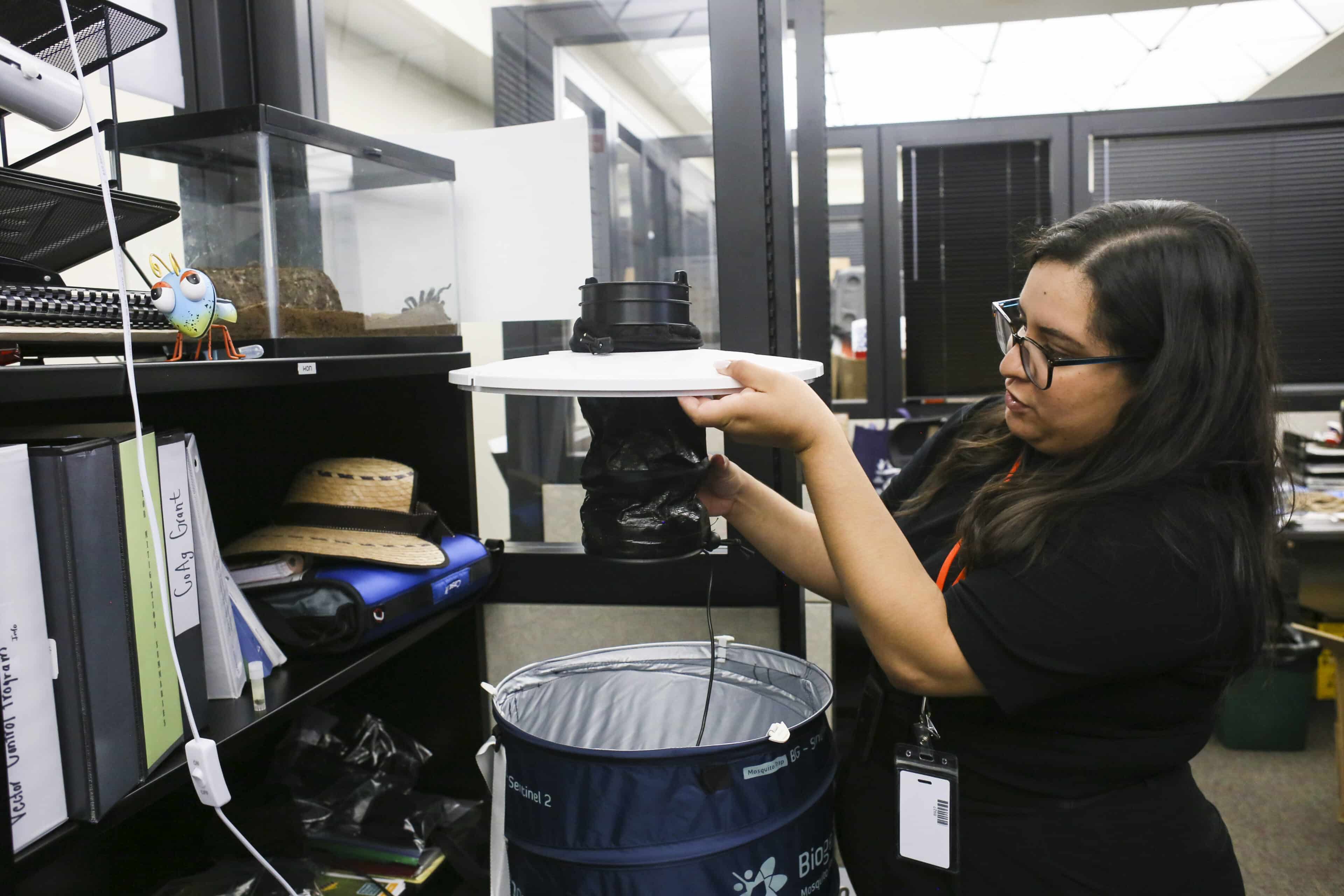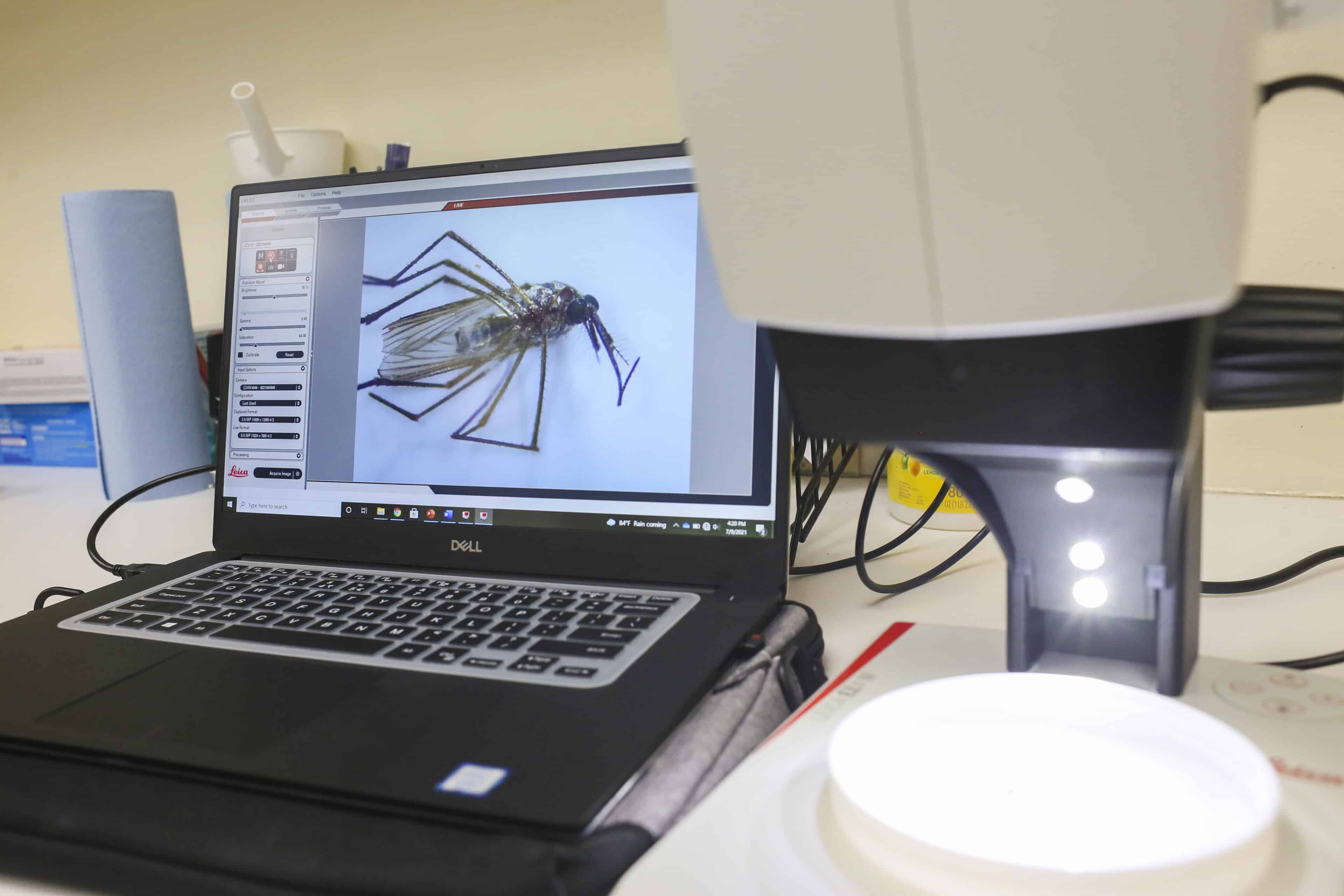|
Only have a minute? Listen instead
Getting your Trinity Audio player ready...
|

The substantial rainfall bringing relief to a parched Rio Grande Valley in recent weeks definitely has been welcome, though the inevitable outbreak of mosquitoes following it definitely has not.
With jumbo-size mosquitoes harassing Brownsville residents in their backyards, at ballgames and cookouts, and on their morning walks, the city health department’s mosquito-reduction program has swung into action, according to Yaziri Gonzalez, the department’s full-time medical entomologist.
She said that in addition to the enormous Psorophora ciliata, also known as the American giant mosquito or “gallinipper,” Brownsville is seeing quite a few culex mosquitoes, a smaller species but even less desirable because, unlike the gallinipper, they can carry diseases like West Nile virus. The gallinipper, despite its size, is just a nuisance that leaves an itchy bite.
The good news is that none of the culex mosquitoes the department trapped last year tested positive for West Nile or any of the other arboviruses they’re known to carry, Gonzalez said. An arbovirus is any group of viruses transmitted by mosquitoes, ticks or other arthropods. As for this year, she said, so far so good.
“We have been trapping since the first week and we haven’t had any positive mosquito pools,” Gonzalez said.
A mosquito pool is what you get when you take all the mosquitoes you’ve trapped and grind them up into a single mass for testing. Mosquito-borne Zika virus, which caused a scare in Brownsville in late 2016, hasn’t been seen since, Gonzalez noted.
In the past, the city’s noisy mosquito-fogging trucks were a sign mosquito control was underway, though some of that equipment has been replaced with updated, quieter rigs, she said. The fog the rigs emit is Biomist, a permethrin-based insecticide that only kills mosquitoes it comes into contact with, having no residual effects, Gonzalez said.
“It’s right then and there,” she said. “That’s why we tend to spray during peak mosquito activity, which is at dawn and dusk.”
Gonzalez prefers to focus on killing larvae rather than adults, and said the trucks don’t go out so often that the insects develop resistance to the insecticide, which has happened in other parts of the country. Specific dates and locations of mosquito-spraying can be found on the city’s BTX Health & Wellness Facebook page.

The treatment of standing water, especially along main roads, is another part of the battle against mosquitoes, the weapons of choice being doughnut-shaped “mosquito dunks,” which dissolve slowly in water and release a bacterium toxic to mosquito larvae. For flooded areas with tall grass, the mosquito fighters broadcast pellets made out of the same stuff, Gonzalez said.
“We are currently catching up with that, just because we’ve been bombarded. … I think we’re about 80 percent done,” she said.
Standing water on private property is a big problem, though the department’s mosquito teams can’t treat it without permission to access the property, Gonzalez said, adding that water-filled tires also are notorious mosquito nurseries.
“We have a lot of areas where people leave their tires out because they think that (trash collection) is going to pick them up,” she said. “Or illegal dumping. We see a lot of illegal dumping in some areas. And then some people just have them outside their house.”
“Tall grass, something the city is getting a lot of calls about these days, likewise adds to the problem,” Gonzalez said.
“That’s the perfect habitat for (mosquitoes) to just sit around during the hot day and then come out during the night,” she said. “Last night we were spraying and there was a lot of high grass. There was one house where I could barely see the windows, it was so high.”

Gonzalez recommends using mosquito repellent, and prefers products with a high proportion of DEET such as Repel or Off Deep Woods, while formulations that resist being sweated off are a good choice for anyone working in the hot sun, she said.
“There are also other products that the EPA recommends, but I am for using DEET,” she said.
A word on DEET: It accelerates the effect of the sun on the skin, according to Gonzalez.
“If you are going to be outdoors and you need to use DEET, make sure you put sunscreen on before the DEET, because you will tan up real fast,” she said.
Although some species of bats eat mosquitoes, Mexican free-tailed bats, the Valley’s most common species, would rather eat moths and beetles. On the other hand, dragonflies are voracious consumers of mosquitoes, said Gonzalez.
A final piece of advice for residents: “Make sure to clean your gutters. Whether they know it not, they hold a lot of mosquito larvae.”



